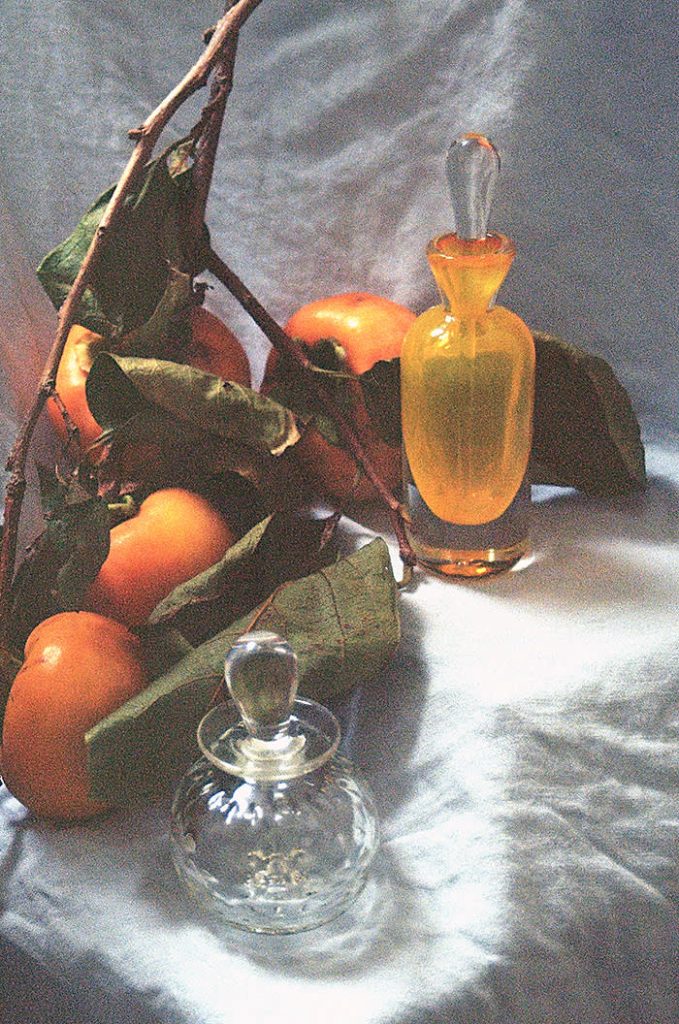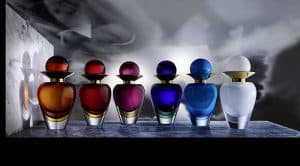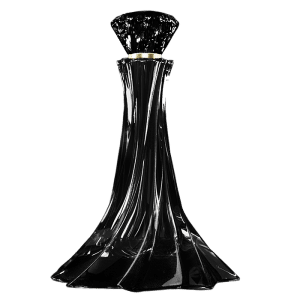The weather may be grey in the north of France, but inside the Waltersperger glassworks in Normandy, the ovens are burning. One worker, known as a picker, takes a mould filled with hot molten glass from the oven, while another (the presser) cuts it with a pair of scissors as if he was cutting an umbilical cord. A new bottle of perfume was born and the factory opened its doors for the great revelation: a bottle that looks like a carafe made of black crystal that can be turned into a candlestick when its contents are finished.
The piece was commissioned by the new perfume house Elegantes London, whose founders, Dagmar and Thomas Smit, were looking for a suitable bottle for their collection of distinctive perfumes created by perfume maker Julien Rasquinet. The limited edition Black Opera bottle, which is designed to look like the swirling sleeves of an haute couture shirt, is hand polished for eight to ten hours and costs £3,000 for 200 ml.
It’s obvious that the Waltersperger glasswork’s expertise and know-how are not cheap. A custom-made bottle, for which a single mould is created, costs about 10 to 20 times more to manufacture than in a fully mechanised factory, depending on the complexity of the glass (whether crystal or coloured, for example) and the quantity ordered. “Discussing prices with our customers is not always easy”, admits Stéphanie Tourres, the President of the company.
Black Opera Bottle from Elegantes London © Raphael Cloix
And yet glass, especially the hand-finished variety, is now being overshadowed. Skincare brands are rediscovering the special nobility and romance of glass. This is an obvious exercise for the post-plastic generation, but it’s also the material of choice for those looking for something in their bathrooms that is both elegant and functional. Waltersperger manufactures opaque white glass jars with triangular facets for La Grande Crème (£650) by Biologique Recherche, the Paris-based skincare brand. It may only be a moisturising cream, but the thick glass jar (hand polished four times before being deemed to be useful) makes it seem like rich pickings, something you’d want to keep for your cufflinks or earrings when you no longer need the cream.
Skincare clients are not discouraged by this apparent lack of practicality. After all, it’s not easy to carry a jar around in your handbag and God help you if you drop it in the shower. Seed to Skin, the new natural organic skincare brand, is completely packaged in glass and has seen its sales increase by 43% each month since it was launched at Liberty in June.
Facialist Amanda Lacey packages everything, from her Miracle Tonic to her camellia oil, in delicate flint bottles and jars made at the Verreries Brosse glassworks in Normandy. “The bottle I use has a nice flowing rim”, says Lacey. “They’re pretty and don’t need a pipette, which lets air into the product, so it’s also practical.”
For some perfume makers, hand-finished glass is not enough; it must be hand-blown. Two of my favourite perfume brands of perfume, Perfumer H, which was created by the English perfumer Lyn Harris, and Curionoir, created by the New Zealand perfumer Tiffany Jeans, work with small mouth-blown glass producers in their respective countries. “At Curionoir, we put a lot of emphasis on handicraft”, explains Jeans, “so the use of mouth-blown glass was a natural progression. As so much time, care and appreciation have been devoted to each perfume, it seemed equally important for the vessel to have the same qualities. ”
Very few glassmakers can make our bottles. To tell you the truth, we had to get someone out of retirement
Amandine Pallez, Heritage and Creative Director, Bulgari Parfums
Mouth-blown glass also has the additional benefit of alluding to heritage. This is a good marketing supplement for relatively new brands such as Perfumer H and Curionoir, but it is even more vital for older brands. “Brands need to find ways to make their handicraft more visible”, says Amandine Pallez, Heritage and Creative Director at Bulgari Parfums. “Perfumes should be rooted in a tangible luxury environment, which involves highlighting the know-how. This has been a prerequisite for luxury goods for centuries and is a deeply rooted point of cultural pride in Europe.”
The new edition of Bulgari, the limited edition Le Gemme Collezione Murano, is made using mouth-blown Murano glass created using the Venetian Sbruffo technique. This results in layers of rainbow-coloured glass. There are only 50 bottles of each of the six perfumes, which are sold exclusively at Harrods for £1,900 each. “This requires cooperation between two glassmakers and very few of them are able to do it”, says Pallez. “To tell you the truth, we had to bring someone out of retirement.”
With plastic being such a pet peeve, glass is also a major player in sustainable development, hence the current trend in apothecary-style jars and bottles. “Unlike plastic, glass is widely recycled”, explains David Lieber, the founder of Slow Aging Essentials. “With 100% natural products, there is also a tendency to lose strength over time as they may oxidise and degrade, but not ours, because it is scientifically proven that dark purple glass blocks harmful UVB and UVC rays.”
But while glass is recycled in a practical way, buckets of broken bottles are scattered around the Waltersperger factory waiting to be melted and remade, which is a major problem. “It takes sand to make new glass”, explains Ms Tourres. “So the entire glass industry relies on its ability to find sand on earth.” Because at the end of the day, sand is a dwindling resource. It’s time to invest in a desert.
By Kathleen Baird-Murray SEPTEMBER 28, 2018 :
Lien article : https://www.ft.com/content/f95d1bf2-5f56-11e8-ab47-8fd33f423c09


 https://www.linkedin.com/company/858518/
https://www.linkedin.com/company/858518/